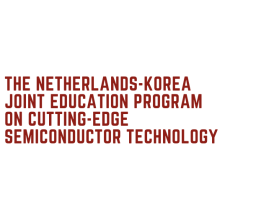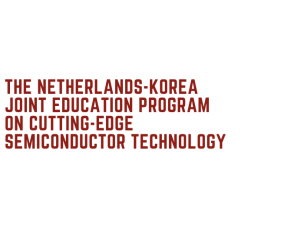We will continuously update this page with speaker information as soon as a speaker is confirmed
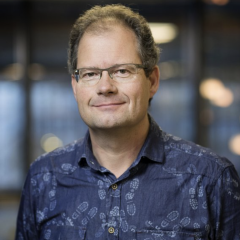
Jeroen Voeten is a full professor at Eindhoven University of Technology in the department of Electrical Engineering and is the scientific director of High Tech Systems Center. Between 2005 and 2019 he worked as senior scientist and was the scientific advisor of the ESI group of the Dutch national institute for applied scientific research, having tight collaborations with ASML. His professional passion is to improve industrial products and design processes through cutting edge model-based design methodologies, by working on the borders between academic research and industrial innovation. His research expertise is performance engineering, including the areas of (stochastic) performance analysis, design automation, scheduling and predictable synthesis. His application domain concerns high-tech cyber-physical systems. He developed and supervised several multidisciplinary research programs that led to various industrial innovations and authored over hundred journal and conference publications.
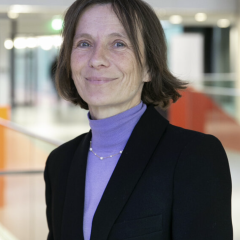
Since 2007, Silvia Lenaerts (1966) has led the Sustainable Energy, Air and Water Technology Group that she founded in Antwerp. The Belgian professor has also been vice-rector of Valorization & Development since 2016. In this role, she serves as a catalyst and connector for Antwerp’s innovation ecosystem. Lenaerts holds a large number of executive positions in the academic world and beyond, including on the Governing Board of the European Institute of Innovation and Technology (EIT). She studied and obtained her PhD at KU Leuven and IMEC. She is the first female Rector Magnificus of TU/e.
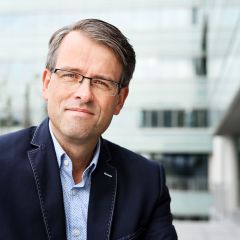
Bart Smolders received his M.Sc. and Ph.D. degree in Electrical Engineering from Eindhoven University of Technology (TU/e) in 1989 and 1994, respectively. He worked at NXP (formerly Philips) Semiconductors, responsible for the innovation in the RF business line. Since 2010, he is full-time professor at the TU/e and chairman of the Electromagnetics Group with special interest in antenna systems and applications, such as 6G wireless communications. In particular, he is co-founder of the FNS-6G national growth-fund project. He is also co-founder of the start-up company ANTENNEX.
Next to his research activities, he was the dean of the Electrical Engineering department of the TU/e in the period 2016-2023. Currently, he is responsible for the Future Chips initiative at TU/e.

Lin-Lin Chen is Full Professor and chair of Design Innovation Strategy. Chen is dean of the Industrial Design Department. Chen conducts research on user interfaces for the Internet of Things, design innovation strategy and aesthetics of forms and intelligence. Her research focuses on product aesthetics, design innovation and interaction design for smart things. With emerging computing, wireless sensing and other emerging technologies, product behavior now goes beyond shapes and immediate reactions to the domains of time, movement and expression.
Chen is editor-in-chief of International Journal of Design (SCI, SSCI, AHCI). Together with dr. Yaliang Chuang, she started the journal from scratch and built it into one of the top journals in design.
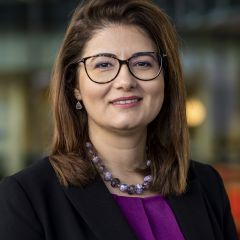
Aida Todri-Sanial is a Full Professor in the Integrated Circuits Group in EE Department at TU/e and PI of NanoComputing Research Lab. Her research interests focus on physics-based computing, neuromorphic computing and quantum computing. Prior to joining TU/e she has held several R&D positions at CNRS, STMicroelectronics, Cadence Design System and IBM TJ Watson Research.

Erwin Kessels is a professor at the Eindhoven University of Technology (TU/e) and he is the scientific director of the NanoLab@TU/e clean room facilities. Erwin received his M.Sc. and Ph.D. degree in Applied Physics from the TU/e in 1996 and 2000, respectively. He chairs the Plasma & Materials Processing group and his research interests cover the field of synthesis of ultrathin films and nanostructures using methods such as (plasma-enhanced) atomic layer deposition (ALD) and atomic layer etching (ALE). With 20+ years of experience in the field of ALD, he has contributed most prominently by his work on plasma-enhanced ALD, his research related to ALD for semiconductor technology and photovoltaics, and ALD for nanopatterning (including area-selective ALD). Erwin has won several awards (the AVS Peter Mark Memorial Award in 2007; the ALD Innovation Award in 2019) and he has organized many conferences and workshops in the field of ALD and ALE. He is an associate editor of the Journal of Vacuum Science and Technology. He is also the driving force behind the AtomicLimits.com blog and the founder of the ALD Academy.

Marc Geilen is Associate Professor in the Electronic Systems group at Eindhoven University of Technology (TU/e). His research interests are in model-based design methods, design-automation and optimization. He is heading the Model-Based Design Lab.

Marion Matters is professor in the Integrated Circuits group at the Electrical Engineering Department of Eindhoven University of Technology. Since 2020 she is Vice-Dean of the department and was Education Program Director between 2020 and 2024. She is scientific director of the Center for Terahertz Science and Technology Eindhoven (CTSTe) and chair of the Integrated Circuits group. She has received her PhD degree at RWTH Aachen (Germany) and pursued a career at Philips Research between 1999 till 2011 with a focus on RF to THz design in System in package technologies. Since 2011 she is with Eindhoven University of Technology. Her research focus is on millimeter-wave to terahertz IC design, photonic-electronic integration and packaging for communication and sensing applications. She is co-founder of the start-up company TeraNova B.V.

Prof. Shihab Al-Daffaie is a professor in Terahertz Nanophotonics and Integration Technology (TNIT) in the Integrated Circuits group at the Electrical Engineering Department of Eindhoven University of Technology. He earned his PhD in Electrical Engineering from TU Darmstadt (Germany) in 2015, where he later founded and led the Nanophotonics and Terahertz Technology (NTT) group. His research focuses on using nano-optoelectronics, -materials, and -technologies in the semiconductor integration field for extremely high-frequency devices (terahertz but not limited) addresses critical challenges in miniaturizing THz systems for applications spanning 6G communications, biomedical sensing (e.g., early virus detection), security (explosive scanning), and industrial quality control. In 2023, he was appointed Focus Area Leader for “Integrated Remote Sensing Systems” at the Eindhoven Hendrik Casimir Institute, driving innovations in remote sensing. Notably, in 2025, he launched the €2.86 million EU-funded Terahertz Integrated Biosensing Project (TeraIBs), coordinating nine universities and five industry partners to develop modular THz biosensors and organ-on-chip models for real-time disease diagnostics, emphasizing his commitment to translating research into healthcare solutions. With over 60 high-impact publications and leadership roles such as chairing the 2023 International Travelling Summer School on THz Science, he bridges academic excellence with industrial collaboration, positioning him at the forefront of THz technology’s global advancement.

Kayoung Lee received the B.S. degree in Electrical Engineering from Yonsei University in 2009, and the M.S and Ph.D. degrees in Electrical Engineering both from the University of Texas at Austin in 2012 and 2016, respectively. She held postdoctoral position at Stanford and a faculty position at GIST. She joined the faculty of KAIST Electrical Engineering in 2021. Her major research interests are electron transport in semiconductor nanostructures and developing next-generation nanoelectronics employing the physical uniqueness in low-dimensional electron systems.

ByungJo Kim is an assistant professor at UNIST (Ulsan National Institute of Science and Technology) in the Graduate School of Semiconductor Materials and Devices Engineering. He joined in 2024 after working as a Staff Engineer in the Mechatronics Research group at Samsung Electronics (2019–2023). He holds a Ph.D. in Mechanical Engineering from Seoul National University and a B.S. from POSTECH. His research focuses on multiscale computational modeling of plasma–surface interactions for advanced semiconductor processing. By integrating quantum, atomistic, and mesoscale simulations, he investigates surface reaction mechanisms in etching and deposition under extreme conditions. He leads a joint project with Samsung Electronics on cryogenic plasma etching and serves on the Etch Future Technology Council. His work aims to bridge fundamental physics and AI-driven modeling to develop predictive, data-enhanced frameworks for next-generation process technologies.

B. D. Choi received the B.S. degree in physics from Kyung Hee University, Seoul, Korea in 1988, and the M.S. and Ph.D. degrees in electrical engineering from Arizona State University, Tempe, Arizona in 1998 and 2001, respectively. He was a Graduate Research Associate under Dr. D. K. Schroder in electrical engineering at ASU. He spent 6 years at Samsung in S. Korea. In 2008, he joined School of Information and Communication Engineering, Sungkyunkwan University in S. Korea, where he is currently a professor of Semiconductor Engineering. His research involves MOS devices, defects in semiconductor, carrier lifetime measurement, and gate oxide integrity.

Gyu Man Kim received the B.S., M.S., and Ph.D. degree in mechanical design and production engineering from the Seoul National University, Seoul, Korea in 1993, 1995 and 1999, respectively. He has been a Associate Research Fellow at MESA+ Research Institute, Twente University, the Netherlands and at Institute of Microelectronics and Microsystems, Ecole Polytechnique Federale de Lausanne (EPFL), Switzerland. He joined into faculty of School of Mechanical Engineering, Kyungpook National University, Korea since April 2003. His research has been done in precision manufacturing and micro fabrication. His most recent work has been focused on micro-fabrication with interdisciplinary work of chemistry, physics and micro-engineering, nano-fabrication of nanomechanical strucutures and nano-mechanics. He is also interested in research area of micro-/nano-fabrication, nano-lithography, and soft lithography.

Jiwon Lee received a Ph.D. degree from the Department of Electrical Engineering, Korea Advanced Institute of Science and Technology (KAIST), Daejeon, South Korea, in 2013. From 2013 to 2018, he was a senior researcher at Samsung Electronics, Yongin, South Korea. From 2018 to 2022, he was a Principal Member of Technical Staff at imec, Leuven, Belgium. From 2022 to 2023, he was an associate professor in the Department of Photonics and Nanoelectronics in Hanyang University (ERICA Campus). Since 2024, he has been an assistant professor at the Department of Semiconductor En gineering at POSTECH. He is a guest professor at IMEC, Leuven, Belgium from 2023 for topics related to novel image sensors. His research interests include the development of novel image sensor pixels for various applications.

Changhwan Choi has been a professor at Hanyang University since 2010 with Division of Materials Science and Engineering and Department Semiconductor Engineering. He is a department chair and director of industrial material technology center at Hanyang University. His research activities consist of material, process, device and characterization for various advanced semiconductor devices in logic, memory, neuromorphic/PIM, 3D heterogeneous integration and packaging materials & process. These devices include TFET, FeFET, NCFET, and CFET for logic device, advanced DRAM, ReRAM, CBRAM, PRAM, SOM and 3D flash memory for memory device, memristor and 3-terminal devices for artificial synapse and neuromorphic/PIM device and system, 3D heterogeneous devices and integration, and packaging materials (PID, ABF) and packaging processing (RDL, package substrate, hybrid bonding, TGV etc). In addition, various semiconductor materials and process technology are being researched. Prior to joining Hanyang University, Professor Choi was a Research Staff Member for IBM Thomas J. Watson Research Center. During his 4 years at IBM, Professor Choi spent time doing high-k/metal gate for advance transistor development and integration. Choi received Ph.D and M.S degrees in electrical and computer engineering and materials science and engineering, respectively, from the University of Texas at Austin and a B.S degree in materials science and engineering from Hanyang University. He has published SCI papers with more than 160 and presented research results at various conferences. Particularly, his ferroelectric-based flash memory was selected as a highlight papers in symposium on VLSI technology in 2020. He holds US patents more than 25.

Stefan De Gendt obtained his master and PhD degree in chemistry from the University of Antwerp in Belgium. He kicked off his imec career in 1996 at the ultra clean processing group, focusing on cleaning technology and analytical metrology for contamination control in CMOS processing. From 2000 until 2017, he governed multiple projects and programs (imec’s industrial affiliation program on high-k dielectrics and the post CMOS nanotechnology program). He was also group leader to imec’s Nano Confined Applications, Interfaces and Surfaces, group). The common thread of his work was to allow further scaling of transistor technologies through unit process and material research. In 2017, he was assigned the role of scientific director at imec and in 2022 he was nominated imec Fellow. At that time, he also took up the position of Director of Academic Relations, specifically for the PhD and postdoc program. He is also affiliated to the KULeuven since 2003, currently as (part time) full professor with the Faculty of Science.

Johan Swerts is the director of the Materials-Interfaces and Deposition-Analysis (MIDA) department (~ 100 researchers and R&D engineers) at imec since 2022. The department focusses on the research and development of novel materials and deposition processes used in imec’s advanced Si 300mm pilot line. The teams in the department cover the full spectrum of thin film deposition techniques used in Si manufacturing such as ALD, CVD, PVD, and EPI, as well as more exploratory techniques for material research for example MBE and PLD.
His career in semicon started when he joined ASM in 2004 to work on the introduction of ALD high-k gate dielectrics in CMOS. He moved to imec in 2009 to develop ALD processes for metallization and emerging memories. He led the PVD development for spintronic applications in 2013 and became Principal Member of Technical Staff in 2015. In 2019 he was appointed as Thin Films group manager that evolved into a department in 2022. Johan Swerts obtained his Ph.D. in Physics in 2003 at the KU Leuven in Belgium. He (co-)authored 18 patents and > 170 peer reviewed journal publications.

Georges Gielen is heading the Analog and Mixed-Signal Design Methodologies subgroup of the ESAT-MICAS division. Together with Prof. Willy Sansen research is conducted on design methodologies and the development of related algorithms and computer-aided design (CAD) tools to be used by analog and mixed analog-digital designers. The goals of these activities are : 1) to increase the productivity of analog designers (shorten the time to market), and 2) to improve the quality and optimality of analog and mixed-signal IC designs (e.g. power reduction, but also avoiding expensive redesign runs).
Georges Gielen received the MSc and PhD degrees in Electrical Engineering from the Katholieke Universiteit Leuven, Belgium, in 1986 and 1990, respectively. From 1986 to 1990, he was appointed as a research assistant by the Belgian National Fund of Scientific Research for carrying out his Ph.D. research in the ESAT-MICAS laboratory of the Katholieke Universiteit Leuven. In 1990, he was appointed as a postdoctoral research assistant and visiting lecturer at the department of Electrical Engineering and Computer Science of the University of California, Berkeley. From 1991 to 1993, he was a postdoctoral research assistant of the Belgian National Fund of Scientific Research at the ESAT-MICAS laboratory of the Katholieke Universiteit Leuven. In 1993, he was appointed as a tenure research associate of the Belgian National Fund of Scientific Research and at the same time as an assistant professor at the Katholieke Universiteit Leuven. In 1995 he promoted to associate professor at the same university.

David De Roest obtained his Master in engineering (physics) at the university of Ghent (Belgium) and his PhD in electrical engineering (semiconductors) at the university of Leuven (Belgium). He joined ASM in 2005 and has been involved in many projects, covering various ALD solutions for applications in future technology nodes. He is currently leading the advanced patterning team of corporate R&D at ASM.

Dr Kishan Patel is a research engineer with specialized expertise in Molecular Layer Deposition (MLD) and Atomic Layer Deposition (ALD) methods for patterning applications used in semiconductor industry. Currently a senior process engineer at ASM Belgium, he develops MLD/ALD processes for EUV lithography, including photoresist underlayers, hardmask, and gapfill materials. He manages R&D projects and collaborates closely with academic partners. Previously, he was a postdoctoral researcher at Politecnico di Milano, focusing on nanoelectronics devices based on 2D materials such as graphene and MoS₂ for sub-20nm transistors. He earned a Ph.D. in Physics in 2020 from the same institution, publishing in top-tier journals including Nature Electronics and ACS Nano. With a strong interdisciplinary foundation and a passion for innovation, he combines hands-on device fabrication skills and academic insight to advance the future of semiconductor technology.

Dr Yoann Tomczak obtained his PhD in Inorganic Chemistry from the University of Helsinki in 2010. His work focused on in-situ characterization of Atomic Layer Deposition (ALD) processes and study of reaction mechanisms for high-k metal oxide formation. During his post-doctoral studies, he joined IMEC and worked on STT-MRAM devices and Selective Deposition of 2D Materials using Atomic Layer Deposition and Chemical Vapor Deposition. In 2018, he joined ASM Corporate Research & Development unit in Belgium as a Process Engineer focusing on Patterning Applications. In 2024, he became team leader for the Device Integration and Advanced Packaging teams. He has authored 15+ scientific publications in peer-reviewed journals, holds 4+ industrial patents and has given 15+ presentations at scientific conferences. His current main research interest are new semiconductor device integration pathways for logic and memory, hybrid bonding and materials with thermal conductivity.

Rob Frijns is Vice President R&D at NXP Semiconductors. He has 35 years experience in the Semiconductor industry in management positions in Research & Development, Manufacturing and Design Platforms. In his current role as CTO Chief of Staff he is driving R&D efficiency and Program Management at NXP. Rob obtained his master degree in Applied Physics at the Eindhoven University of Technology.
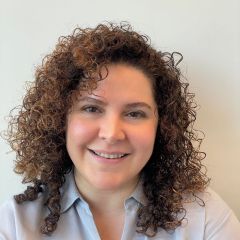
Vina Faramarzi is a technologist and researcher in ASML, her work is focused on advanced patterning solutions for emerging semiconductor device technologies. She did her PhD in the university of Strasbourg on “light-triggered molecular electronics in the 10-100 nm size range” where nanofabrication, electronics and chemistry meet to form novel semiconductor device concepts. She collaborates closely with research organizations as imec and several academic institutes across Europe
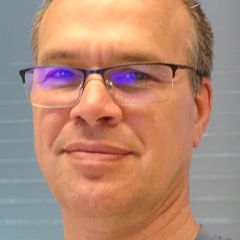
Dr. Van der Wel has been with NXP since 2005, and is currently Innovation & Roadmap manager at the Analog & Mixed Signal Competence Center of NXP in Eindhoven. He holds 15 patents, and has authored or co-authored over 15 peer-reviewed papers. He leads a team of analog circuit designers designing cutting edge IP in advanced CMOS and SOI processes, in the fields of power management and references. Dr. Van der Wel holds a PhD and MSc in Electronic Engineering from the University of Twente and is a qualified physics teacher.
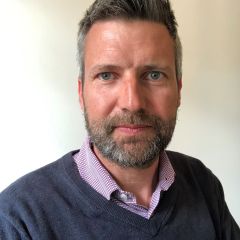
Dr. Alessio Filippi has been with NXP since 2012, and is currently Fellow in the business line Radio Frequency processing. He is part of the Innovation team and manages and contributes to the long term program on digital algorithms and advanced waveform for automotive radar. He holds 20 US patents, and has authored or co-authored over 25 peer-reviewed papers.
Dr. Filippi holds a Doctorate degree in Electronic Engineering from the University of Kaiserslautern, Germany and a Master degree in Telecommunication Engineer from the University of Padova, Italy.

Lulu Braak-Chan graduated from Eindhoven University of Technology with a Master of Science degree in Electrical Engineering. She joined NXP Semiconductors in 2014 in the Automotive department and is currently a Senior Principal Systems Architect in the Automotive System Engineering and Marketing (ASEM) team, focusing on In-Vehicle Networks and ADAS/Radar. Lulu also acts as the local engineering manager for the Vehicle System Engineering team in ASEM Eindhoven. Next to that, Lulu serves in technical program committees of scientific conferences, representing the industry and focusing on automotive applications, time sensitive networking, in-vehicle architectures and Software-Defined Vehicles.
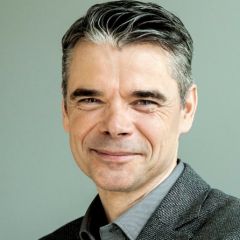
John Smeets is Program Director part of NXP CTO Office covering Chief Technology Office program planning, Long Term Innovation and University Research programs.
30 plus years experience in Innovation program and project management covering all aspects of the funnel from scouting/research until consumer product development.
Active in consumer electronics, components and semiconductor industries. Worked with end-customers and internal customers.
Responsibilities from proof of concept until manufacturing release of new product.

Wesley Crock is in charge of university relations in Europe at ASML since June 2023. In this capacity Wesley unites the European higher education system with ASML, by establishing and fostering symbiotic relationships with key universities in order to create knowledge and talent collaborations. Prior to this from 2016-2022, Wesley was Head of Education at the Raw Materials innovation community at the European Institute of Innovation and Technology (EIT), where 300.000 learners in 35+ countries were educated under his leadership. At EIT Wesley created and was Director of the Higher Education (HEI) Initiative, a EUR 400M, pan-European programme to strengthen the innovation and entrepreneurial capacity of 550+ universities in 30+ Horizon Europe countries. Wesley also united the European raw materials and earth observation communities by working together with the European Space Agency (ESA) and the EU Copernicus programme to establish the Earth Observation for Raw Materials Skills Programme (RawMatCop).
From 2008-2016 Wesley was a researcher at the sustainable cycles programme of United Nations University (UNU) and led its capacity building strategy, equipping policymakers and SMEs with key knowledge and networks to design and implement evidence-based e-waste management policy and systems in Africa and Latin America.
An academically-trained environmental scientist, Wesley holds a Master of Science degree in Industrial Ecology from TU Delft; his research investigated and modeled the theoretical potential of a neodymium circular economy to meet climate targets in the Paris Climate Accords and reduce raw materials criticality (spoiler: in the short- and medium-term, secondary supply of neodymium is not enough – neodymium mining is necessary to meet demand for neodymium-containing products).

Yoeri van de Burgt is associate professor at Eindhoven University of Technology leading the neuromorphic engineering group. He obtained his PhD degree in 2014 and briefly worked at a high-tech startup in Switzerland after which he worked as a postdoctoral fellow at the department of Materials Science and Engineering at Stanford University. He has been a visiting professor at the University of Cambridge in 2017 and Georgia Tech in 2022, and was awarded an ERC Starting Grant in 2018 and an ERC Consolidator Grant in 2023. He is one of the MIT Technology Review innovators under 35 Europe and was awarded the Ammodo Science Award for fundamental research in 2025. Yoeri is a member of the scientific advisory board of the Centre for Cognitive Systems and Materials at the University of Groningen and serves on the editorial boards of IOP Neuromorphic Computing and Engineering and Materials Science and Engineering R.

Weiming Yao is a University Researcher in the Photonic Integration research group of Prof. Kevin Williams at Eindhoven University of Technology (TU/e). His key field of expertise is in high-speed optical components, semiconductor lasers and high-density photonic integrated circuits (PICs).
Currently, he is working on ways to intimately connect photonic circuits with electronics and further improve on speed and density of PICs. A new field of interest is neuromorphic photonics, where he explores the possibilities of building neural networks in photonic circuits.

Manil Dev Gomony is currently an Assistant Professor with the Department of Electrical Engineering at Eindhoven University of Technology and a Researcher at Nokia Bell Labs. He received his Master’s and PhD degree in electrical engineering from Linköping University, and the Eindhoven University of Technology, in 2010 and 2015, respectively. His research interests include the various aspects of low power digital hardware design starting from architecture to circuit-level covering different processor architecture types and memory systems.
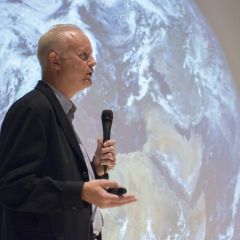
Clément Goossens has many years of experience in managing innovation in industry (Philips and NXP Semiconductors) and is currently Head of Eindhoven University’s Office for Strategic Industry and Government Affairs. The office leads the development of and cooperation within TU/e’s strategic networks in politics, government and industry, where impact (innovation) is paramount.

Prof. Federico Corradi is a Professor in the Electrical Engineering Department of the Eindhoven University of Technology, leading the Neuromorphic Edge Computing Systems Lab. Prof. Corradi received a Ph.D. degree in Neuroinformatics from the University of Zurich and an international Ph.D. from the ETH Neuroscience Centre Zurich in 2015. He was a Postgraduate at the Institute of Neuroinformatics in 2018. From 2015 to 2018, he worked in the Institute of Neuroinformatics’ spin-off company, Inilabs, developing event-based cameras and neuromorphic processors. From 2018 to 2022, he contributed to several neuromorphic IC designs at IMEC, the Netherlands. His research focuses on neuromorphic computing and ultra-low-power smart sensing technologies. He is an associate editor for the Elsevier Microprocessors and Microsystems journal and he serves as a review editor for Frontiers in Neuromorphic Engineering and IEEE Integrated Circuits and VLSI, among other international journals. In addition, he is a technical program committee member for several international conferences and symposia, including ICONS, IJCNN, NEWCAS, AIAI, DSD, and TINYML

Victor Sánchez, currently serving as the Managing Director of TU/e High Tech Systems Center (HTSC), brings over a decade of experience in innovation management within high-tech sectors. Previously, he spent seven years as a program manager in the Electronic Systems Group at the Electrical Engineering department, connecting research visions with industrial needs .Before joining TU/e, Victor dedicated eight years as the Innovation and Technology Director for a Spanish SME, contributing to key decisions within business organizations. His collaborative efforts include coordinating numerous European research projects along with several Dutch and Spanish initiatives. Victor’s professional journey is driven by a genuine passion for creating strategic programs rooted in visionary roadmaps. He focuses on coordinating activities between partners to address industry needs, striving for impactful progress within the dynamic realm of high-tech innovation.
